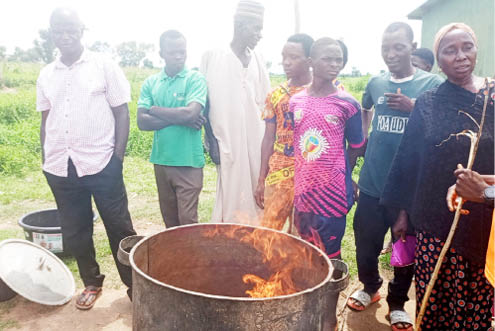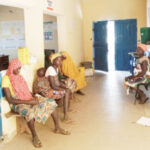Residents of Agunji in Nasarawa Eggon LGA of Nasarawa State have found an alternative to charcoal produced from wood, which results in massive tree felling. The locals, instead produce briquette charcoal to mitigate the impacts of climate change in the state.
Agunji used to be a pristine village snuggled at the foothills of the splendid Eggon mountain ranges but it was despoiled by deforestation, with many of its trees felled for timber and charcoal production for use in towns and cities across Nigeria.
But now, the residents are elated that at least no tree would be felled for charcoal production as they can produce charcoal from leaves and other wastes.
Mr Jonathan Attah, a resident of the community, explained that briquette production is a sustainable means of producing fuel for cooking as it does not amount to cutting down trees for firewood or charcoal.
He said apart from the charcoal production process being dreary — tree felling, cutting and burning to extract charcoal — is highly toxic to the environment as the burning releases greenhouse gases into the atmosphere.
He said, “Briquette charcoal production has a lot of advantages compared to the normal way of tree felling before getting charcoal. The normal charcoal when you use it after cooking, it melts immediately and it doesn’t last long unlike briquettes. After you finish cooking and you pour water on the briquettes to extinguish the fire, you dry it in the sun so that it can be reused because it has regained its energy.”
According to the Global Forest Watch, in the past two decades, from 2001 to 2022, Nigeria experienced 11% of tree cover loss which occurred in areas where the dominant drivers of loss resulted in deforestation.
Also speaking separately in interviews on the advantages of briquettes charcoal production, Messrs Henry Adagari and Clement Angunji, said briquettes burn better and produce more heat to cook food quicker compared to charcoal made from wood.
They reiterated that cutting down trees exacerbates the climate crisis and results in the waste of wood resources.
“Briquettes charcoal, if prioritised by government, will help in reducing pollution as refuse dumps would be cleared and used in producing the briquettes.
It also helps in controlling erosion. The refuse which litters our environment is what we use to produce the briquettes charcoal. The normal charcoal that we get from tree felling has a long process to get charcoal from it, and putting it into use unlike this new product (briquettes) that you only get or collect from the refuse dump around our environment which is turned into charcoal.
“We used to cut down trees and assemble them before processing charcoal from it and that affected our economy, our life, and our entire environment which is being ruined by climate change impacts.
“So we are appealing to the Nasarawa State and federal governments to promote and prioritize briquette charcoal production in the state,” they added.
The Nasarawa State Chief Executive Officer of briquettes charcoal product, M. Micah Esla-Methuselah, said he has trained many people in briquette production to mitigate the effects of climate change.
He said through alternative means of briquette charcoal production, forests would be conserved as farm waste can always be used in the production of the biochar.According to him, briquette production started in Agunji community area of Nasarawa Eggon on August 23, 2023 after briquette production training in Lafia, the Nasarawa State capital.
He disclosed that the training was sponsored by Oxfam, Africa Activists for Climate Justice (AACJ), in collaboration with the Young Men’s Christian Association (YMCA), Mada and Assapin respectively.
Mr Esla-Methuselah, who is a graduate of Federal University Lafia’s Department of Zoology, said the aim of embarking on briquette charcoal production was to fight against poverty and encourage the less privileged in society.
Esla-Methuselah, who is also the project tracking officer of YMCA, hinted that they had produced more than 60,000 bags of briquettes since its production and each bag is sold at N4,000 while the wood charcoal is sold at N5,000 to N6,000 per bag.
“We are fighting against the effect of climate change in society and also poverty; because an average farmer cannot afford to buy cooking gas as it is very costly. The briquette charcoal product is advantageous in many ways some of which is that it doesn’t stain pots while cooking and it lasts from one or two hours more than the wood charcoal while cooking,” he concluded.
Adding his voice to the briquette charcoal production, the District Head of Agunji, Yakubu Abdullahi-Angibi, explained that the innovation of briquette charcoal production has brought a lot of changes to residents of the community, adding that the product does not blacken their pots while cooking or emit smoke.
He said, “Whenever you are using briquette charcoal product, it doesn’t finish on time compared to the wood charcoal. We used to buy the wood charcoal at the rate of N4,500 per bag sometimes, but we buy the new charcoal at the rate of N500 per small bag.”

 Join Daily Trust WhatsApp Community For Quick Access To News and Happenings Around You.
Join Daily Trust WhatsApp Community For Quick Access To News and Happenings Around You.

